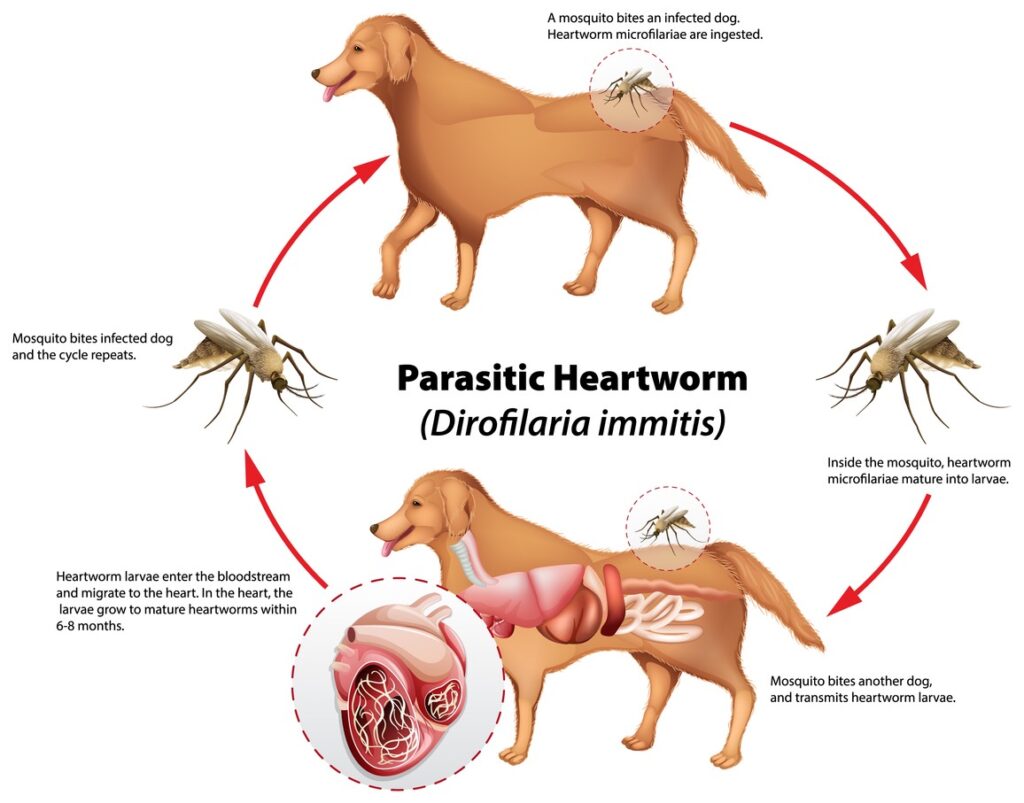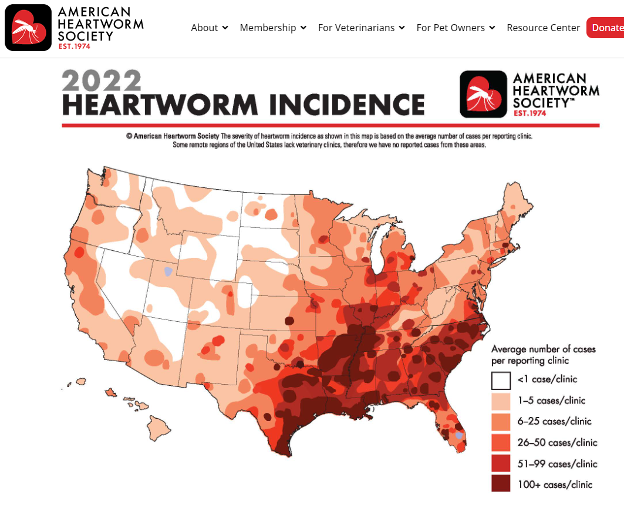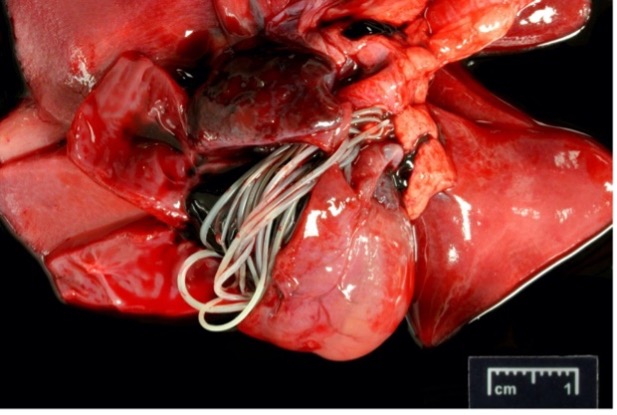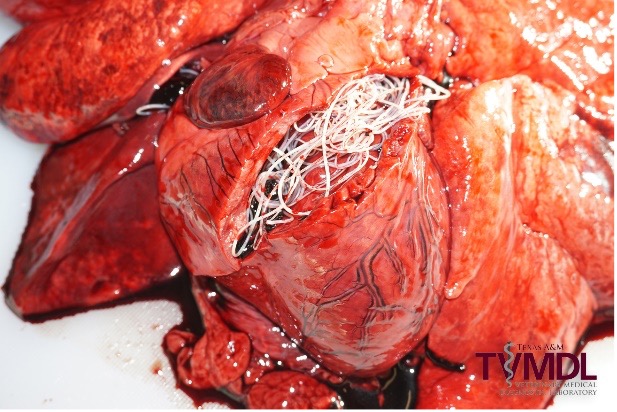Heartworm disease is preventable, but without preventative treatment, it poses a serious threat, often unnoticed until its advanced stages. This blog provides essential information on heartworm disease, covering symptoms, treatment, and preventive measures. Guard your furry friends against this silent killer to ensure their well-being.
What is Heartworm Disease?
Tiny worms transmitted to pets through the bite of a female mosquito cause heartworm disease. These worms have a complex lifecycle involving multiple development stages within both the mosquito and the host animal.
The Lifecycle of Heartworms

The life cycle of a heartworm involves five stages:
- Mosquito Infection: It starts when a female mosquito bites an infected animal (usually a dog or a wild animal like a coyote or fox) carrying microscopic baby heartworms, called microfilariae, in its blood.
- Development of Heartworms in the Mosquito: Inside the mosquito, these baby heartworms mature into larvae in about 10 to 14 days.
- Transmission: When the infected mosquito bites another animal, it injects these larvae into the animal’s bloodstream.
- Migration to Heart and Lungs: The larvae travel through the infected animal’s bloodstream until they reach the heart and lungs. There, they grow into adult worms over several months.
- Mating and Production of Microfilariae: Once matured, the adult worms mate and produce microfilariae, which circulate in the infected animal’s bloodstream, completing one cycle.
Common Myths About Heartworm Disease
Before we continue, let’s address some common misconceptions about heartworm disease that have sadly led pet owners to underestimate the risk of heartworms to their pets.
- One common myth is that indoor pets are not susceptible to heartworm infection. However, mosquitoes can easily find their way indoors; all it takes is one bite to transmit the disease.
- Some pet owners believe that if a pet has long or thick fur, a mosquito cannot penetrate the fur. A mosquito’s proboscis (mouth) has no trouble going through a thick layer of fur.
- Another misconception is that heartworm disease only affects dogs. While dogs are more commonly affected, cats and ferrets can contract heartworm disease, and the consequences can be just as severe.
Symptoms and Signs of Heartworm Disease in Pets
In the early stages, pets may exhibit subtle signs such as a mild cough or fatigue. This disease is often referred to as the “silent killer” because, in its early stages, it usually shows no symptoms or only very subtle ones. Pets infected may not show any signs until the disease has progressed to a more advanced stage. Significant damage may have already occurred to the heart, lungs, and other organs by this time. Below are the symptoms the American Heartworm Society lists for dogs, cats, and ferrets:
Dogs:
- Mild, persistent coughing
- Reluctance to exercise
- Fatigue after moderate activity
- Decreased appetite
- Weight loss
As heartworm disease progresses, dogs may develop heart failure and the appearance of a swollen belly due to excess fluid in the abdomen.
Cats:
Signs of heartworm disease in cats can be very subtle or very dramatic. Symptoms may include:
- Coughing
- Asthma-like attacks
- Periodic vomiting
- Lack of appetite or weight loss.
- Occasionally, an affected cat may have difficulty walking, experience fainting or seizures, or suffer from fluid accumulation in the abdomen.
Ferrets:
- Decreased appetite
- Weight loss
- Paralysis of the hind legs
- Enlarged abdomen
- Dark-colored urine
Unfortunately, in some cases, the first sign is the sudden collapse or death of the cat or ferret.
Diagnosis and Testing for Heartworm Disease
Early detection of heartworm disease is crucial for successful treatment and prevention of further complications. We typically perform a series of tests to diagnose heartworm disease, including a blood test that detects the presence of adult heartworms or their offspring. Imaging techniques like X-rays or ultrasounds can tell us the extent of the infection.
Treatment Options for Heartworm Disease
Treatment for dogs involves medication, rest, and close monitoring by veterinarians, sometimes requiring surgery.
Unfortunately, no approved drug therapy for heartworm infection in cats or ferrets exists, and the drug used to treat infections in dogs is unsafe for them. Nevertheless, we can often help cats and ferrets with good veterinary care. The goal is to stabilize your pet and determine a long-term management plan.
Heartworm Cases in Houston, Texas

Texas is one of the top 10 states where heartworms are most common compared to cooler northern states. Since heartworm can lead to serious health problems for our furry friends, pet owners must prioritize prevention.
Prevention and Proactive Measures Against Heartworm Disease
 |  |
Texas A & M Veterinary Medical Diagnostic Laboratory
The above picture on the left is of the heart of a ferret that died suddenly of heartworm disease. The one on the right is of a dog with heartworm. It can be hard to view these pictures, but it is vital to understand how much the worms can multiply and how long they can get. As the worms multiply and grow within the heart and lungs of a pet, they cause inflammation, damage blood vessels, and disrupt normal blood flow. If left untreated, this can lead to heart failure, organ damage, and, finally, death. Treating advanced cases of heartworm disease can be challenging and costly, and it may not always guarantee a full recovery. Therefore, prevention is essential in ensuring your pet’s long and healthy life. Follow the prescribed preventive medication’s directions to ensure your pet’s protection.
Do You Need a Prescription for Heartworm Medication?
The answer is, YES! Here is the reason from the AVMA:
“Heartworm preventatives are labeled as “prescription-only” because it’s critical that your veterinarian makes sure the medication is the right one based on your pet’s health status. Heartworm preventatives target infective larvae as they are migrating through the tissue prior to reaching the bloodstream and developing into adult heartworms. If your pet already has adult heartworms, giving a preventive medication will not effectively treat the disease because the preventives don’t readily kill adult heartworms.”
Also, giving a heartworm preventive to a pet infected with adult heartworms may be harmful or deadly. If microfilariae are in the pet’s bloodstream, the preventive may cause the microfilariae to suddenly die, triggering a shock-like reaction and possibly death in the pet.
The Importance of Regular Veterinary Check-Ups
Regular veterinary check-ups are essential for maintaining your pet’s overall health and well-being, including protection against heartworm disease. During these visits, Dr. Lowenstein can perform routine screenings for heartworm infection, assess your pet’s overall health, and provide guidance on preventive measures. She can also address any concerns or questions regarding heartworm disease or other potential health issues.
Safeguarding Your Furry Friend’s Health Against Heartworm Disease
In conclusion, understanding the risks, symptoms, treatment, and preventive measures for heartworm disease is crucial for safeguarding the well-being of your beloved pets. Remember, prevention is critical, so don’t hesitate to contact usfor your pet’s regular veterinary check-ups or for your pet’s preventive medicine. Together, we can protect your pets from the devastating effects of heartworm disease.
If you are a new client, don’t miss out on our New Client Exam offer:
Warm regards,
Your Caring Team at
Braescroft Animal Clinic




